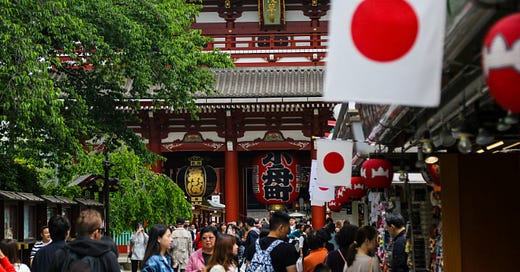Hello and welcome!👋
Apologies, Deep Dive is sliding into your inbox a few days late. This edition focuses on Japan’s currency puzzle, candid conversations at the Qatar Economic Forum, and why orange juice could get really pricey.
As always, your likes, comments and feedback are very much appreciated.
YEN INTERVENTION
Japan is familiar with tourists delighting in its bustling cities, gorgeous nature, delicious food and unique culture. However, residents are saying enough is enough after a recent surge in foreign visitors.
Case in point: One town is attempting to deter crowds by building a giant screen to block Instagrammable views of Mount Fuji.
What’s driving the current Japan mania? A key factor is the weak yen. The currency has lost considerable value against the dollar and euro, making Japan seem less expensive than in the past.
The exchange rate is beneficial for inbound travel as well as companies exporting goods abroad, but a declining yen is also problematic for the Japanese population. Despite the scale of its economy, Japan has been battling sluggish growth, static wages and tepid consumption for decades.
With the yen under renewed pressure, Japanese workers and shoppers are behaving more cautiously, and this is negatively impacting GDP. It’s a headache for policymakers in Tokyo who need to strike the right balance.
In fact, the country’s finance ministry and central bank decided to intervene in the currency markets this spring, spending a record US$62 billion to strengthen the yen. But ultimately, that did very little to alter the downward trajectory. Experts say elevated interest rates in the US combined with underlying economic issues in Japan mean the yen conundrum won’t disappear anytime soon.
WIDE-RANGING DISCUSSIONS
Conference season is hitting its stride before the summer break. If you want a snapshot of the themes and trends on the minds of presidents and prime ministers, CEOs, investors and tech founders - the Qatar Economic Forum is an excellent place to start.
The 2024 instalment covered an impressive variety of subjects, from geopolitics to mining to sports. Here’s a recap of some of the interviews.
[Full disclosure: I’m a Bloomberg employee and worked on the Forum in 2023.]
THE OJ SQUEEZE
In February, I wrote about the cocoa bean supply crunch, which was threatening to hike up the price of chocolate. Now another staple is challenging the food and beverage industry.
Orange juice - or, specifically, orange juice concentrate - is trading higher in the futures market amid worries of poor harvests in Brazil. While analysts were expecting a drop in output this year, farmers in the main orange groves of the country are warning of an even worse result.
They say heat stress and drought encouraged the spread of disease, damaging crops during the vital flowering period. Brazil accounts for 70% of all orange juice exports, so this is major. The world’s second-biggest producer, Florida, has also been plagued by bad weather.
Dwindling stocks of frozen orange juice are pushing businesses to ask if they can blend their supplies with various citrus species, like mandarins and lemons, or try entirely different fruit, such as apples and pears.
Changing the ingredients of orange juice, though, would require amendments to regulations and laws, both at international and national levels.
Thanks for reading! Take care and stay curious, Sara x





